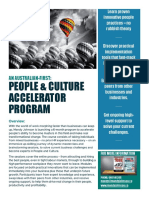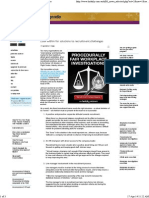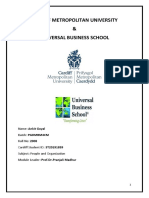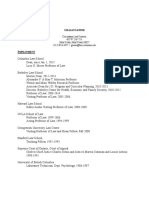Professional Documents
Culture Documents
How Low Can You Go - Flight Centre Learns From Past Mistakes
Uploaded by
mandyjohnsonozCopyright
Available Formats
Share this document
Did you find this document useful?
Is this content inappropriate?
Report this DocumentCopyright:
Available Formats
How Low Can You Go - Flight Centre Learns From Past Mistakes
Uploaded by
mandyjohnsonozCopyright:
Available Formats
HCAMAG.
COM
ISSUE 12.7
AUSTRALIAN
HR AWARDS
FINALISTS
REVEALED
HUMAN RESOURCES DIRECTOR
Global experience,
local expertise
Inside HR at Unilever
CHANGE
MANAGEMENT
FLIGHT CENTRE
LEARNS FROM
PAST MISTAKES
RIDING THE PEAKS
AND THE
TROUGHS
SHELL OILS
JOHN HOFMEISTER
REWARD
TRENDS 2014/15
ROAD AHEAD
OR DEAD-END?
Cover+spine_4_subbed.indd 2 3/07/2014 3:26:45 PM
16 | JULY 2014 HCAMAG.COM
CHANGE MANAGEMENT / FLIGHT CENTRE
Despite good intentions and
careful planning, sometimes
corporate strategies and
projects simply do not work.
Such was the case with
Flight Centres change initiative,
Full Throttle. HR Director asks
what went wrong
How low can
you go?
Full Throttle was the in-house name given to Flight
Centres business restructure introduced in late
2004 and cancelled in 2005. During the much-
vaunted Full Throttle, unique company culture
was diluted by introducing external management
consultants and giving executive jobs to outsiders.
The rawness of the failure is still palpable for key
players. Rather than hide behind the mistakes made,
the company has embraced the failure as a key
component of its history, and has shared its
tumultuous ride in a book titled Family, Village,
Tribe, authored by former Flight Centre executive
Mandy Johnson. She chats to HR Director about a
compelling and brave decision on the companys
part to reveal all.
Flight Centre
learns from
past mistakes
16-19_CM-FlightCentre_Subbed_1.indd 16 3/07/2014 3:28:39 PM
JULY 2014 | 17 HCAMAG.COM
HUMAN RESOURCES DIRECTOR
HR Director: Can you outline your involvement
with Flight Centre what role did you have at
the company?
Mandy Johnson: I started with Flight Centre as a
travel agent when they only had a few stores, really
as a way to fund myself through university. I rejoined
them after travelling overseas for a few years. I
managed a couple of stores and then made the
mistake of getting drunk at a conference and telling
the CEO that the way Flight Centre recruited and
trained people was crap. He rang me two weeks later,
and I was sure he was going to sack me. Instead he
told me that if I knew so much about HR, then I
could set up the companys rst recruitment and
training centre.
Eighteen months later, after that operation was
successful, I tried to quit to go backpacking around
South America but somehow was bamboozled into
heading over to the UK to co-found Flight Centres
operation there instead. I became a director of the
UK operation, the companys youngest-ever, before
returning to Australia as the national HR head.
HRD: Are you still involved with the company?
MJ: Since I left Flight Centre Ive written two books
[Family, Village, Tribe and Winning the War for Talent]
and I now run my own speaking/consulting business.
Yet its a standard joke that no one ever really leaves
the organisation. Flight Centre doubles in size every
ve years so its always changing, and whenever its
needs intersect with what Im doing, I end up getting
a call from Graham Skroo Turner [Flight Centres
founder and now managing director]. Im still friends
with many of the people I worked with.
HRD: Its unusual for a company biography
to be warts and all, yet your book is. Why did
Flight Centre cooperate on such a book?
MJ: This really reects Skroos approach, as he is
famous for his almost total information sharing.
Anyone whos tried to discuss their salary or future
career path with Turner ends up talking to him in his
open-plan ofce, with the rest of his team working
away around them. He simply doesnt understand
why anyone would want privacy discussing anything.
In the same way, when I rst approached him
about writing this book he told me, Dont write one of
those sickly corporate books that glorify the company.
We need to have all our mistakes in there thats what
has really shaped us. In fact, the original manuscript
was so warts and all that I found myself in the rare
position of having the publisher censor some of the
content, because they thought it was too out there,
even though Flight Centre was happy for it to run.
HRD: The book is handed out to new recruits
at Flight Centre again, why is this done?
MJ: One of the problems rapidly growing organisa-
tions face is how to stay true to their own values and
philosophies, and keep that sense of where they have
come from. Flight Centre identied this book as a
really valuable cultural tool for its people, a way for
them to avoid repeating past mistakes yet connect
them with the spirit of the founding pioneers. Or as
senior executive Joell Ogilvie so aptly put it, We
have to make sure we all know the story about our
crackpot vet. Skroo was a veterinarian before he
started Flight Centre.
HRD: Can you outline Full Throttle?
Why did Flight Centre embark on this
restructure/transformation program?
MJ: The Full Throttle campaign, which Skroo now
refers to as Flight Centres greatest f***-up, started
as a simple efciency improvement project in 2004.
In the 2003/4 nancial year, revenues had grown
24%, but prots had virtually atlined and head
ofce staff numbers had blown out.
With the operation out of kilter, the company
talked to some external consultants who promised
a prize of over $100m in savings over three years.
This was an alluring proposition after January
2005 when the company issued a prot downgrade
announcement and suffered its largest share slide
since its 1995 listing.
Flight Centre decided to go ahead with the
project and began to implement stage one:
10 priority initiatives to bring about
quick cost savings.
HRD: Our readers are used to
success stories when it
comes to transformation
programs, but Full Throttle failed.
Can you outline what happened?
MJ: No one minded the product cost savings, but the
16-19_CM-FlightCentre_Subbed_1.indd 17 3/07/2014 3:29:55 PM
18 | JULY 2014 HCAMAG.COM
CHANGE MANAGEMENT / FLIGHT CENTRE
restructure of Flight Centres head ofce hit the
organisation like a tsunami. It was the rst time
employees jobs had ever been axed and, because
the external consultants had little understanding of
what people brought to their roles, many decisions
were simplly driven by theoretical cost-savings and
salary cutting.
They also used practices, such as spilling people
from their roles and making everyone reapply, that
were the antithesis of Flight Centres people-friendly
culture. Staff responded with outrage as morale
plummeted. Police crime tape and chalk outlines of
slain bodies appeared around the ofce in reference
to the ongoing cull, and people came to work in
pyjamas and threw Full Throttle parties on the day
redundancy slips were issued. Many key people quit
in disgust at the process, and the impact of losing
them would be felt for years afterwards. As senior
executive Melanie Waters-Ryan said, Full Throttle
will forever be seen as the era in which the company
completely lost its mind.
HRD: How did the company survive the trauma?
What steps did it take to improve and restore
the former culture?
MJ: Once he realised the true impact of what was
happening, Skroo stepped in to disband Full Throttle,
almost overnight. Yet the damage had been done.
Flight Centres prots for 2004/5 were down by 17%
from the previous years mark, and it would take
several years for the company to rebuild the trust
with its own people.
In the soul-searching that followed, the key
question raised was why external consultants had
been given such complete control. Or as then-
company secretary Greg Pringle said, why did we
give them the keys to the front door and then allow
them to change the locks?
The company identied two signicant issues.
The rst was that the leadership team had been split
into two entities a few years earlier, with Skroo as
managing director and Shane Flynn as CEO. This
joint leadership role had exacerbated the Full
Throttle process, with people playing the teams
off one against another, and had led to decision-
making inertia and lack of ownership. As Skroo
said, In the end youve got to have one person,
total responsibility. CEO Shane Flynn was another
victim of the process and left the company in
September 2005.
The second factor identied as a cause of the
debacle was that six out of 10 people on the
executive team had come from outside the business,
with little real understanding of the culture. As
Skroo said, We were looking for silver bullets to
fast-track growth when these didnt exist.
Turner put a new executive team in place
externals were out and old-timers back in and
updated its philosophies to include: Promotions
and transfers within will always be our rst choice.
The current executive team has over 60 years
combined experience and the company now actively
avoids recruiting external people for senior or
executive positions.
HRD: Can you provide any other tips to
executives who are perhaps embarking on or
have embarked on similar change programs?
MJ: The key message is for a company to stay true to
its own values and philosophies, even when it may
have to implement difcult change programs. The
core reasons for the Full Throttle project were
sound; it was the way it was put into practice that
was the issue.
During the GFC, Flight Centre laid off some more
employees, but with the lessons learnt from Full
Throttle, they did it in a much more humane way,
with effective communication and transparency,
so there was no associated morale loss. Also,
the company learnt that constant, focused and
incremental improvements, rather than a single
dening action or grand project, leads to the most
sustained and spectacular results.
No one minded the
cost savings, but the
restructure of Flight
Centres head ofce hit
the organisation like a tsunami
Mandy Johnson
16-19_CM-FlightCentre_Subbed_1.indd 18 3/07/2014 3:30:02 PM
JULY 2014 | 19 HCAMAG.COM
HUMAN RESOURCES DIRECTOR
HRD: Whats the status of Flight Centre now?
Has the dust settled from this failure?
MJ: Even though it was a car crash at the time, the
Full Throttle debacle did have one positive effect. It
forced the company to go back to basics, focus on
its fundamental philosophies and rebuild the trust
with its staff. The company created a whole new
department called Brand Warriors to educate its
own people in its history and promote internal
innovations that support corporate values. It took a
few years, but this return to fundamentals is now a
major factor in the companys current success.
Flight Centres share price is now hovering between
the $40$50 mark and it is operating protably in
all 11 countries it has a presence in.
HRD: The travel industry has changed out of all
recognition in recent years with the boom in
internet bookings, etc. How has Flight Centre
survived?
MJ: Flight Centre was called a Neanderthal a few
years ago for continuing to grow its bricks and
mortar stores, yet now those same detractors
are calling the company visionary. People are
denitely booking more hotels and point-to-point
airfares online, and Flight Centre has bought a
number of online businesses to service this trend,
yet for anything more complicated or expensive
many travellers still want to deal with someone
face-to-face. And with travel crises such as
volcanic eruptions, bird u and even revolutions
happening on an almost everyday basis, more and
more travellers now want to feel they can pick
up the phone and speak to a consultant, who
theyve built a personal relationship with, when
they really need help.
The other factor that has enabled Flight Centre
to survive this industry metamorphosis is its
innovative family, village, tribe concept. The
organisations small, exible team structure means
that, no matter how big the company becomes,
each employee still feels like they are running their
own business within the business. What this does is
keep the company innovative when other large
corporations become hidebound with bureaucracy,
and the smaller teams are much more protable
too. As Skroo often says, If our business model is
right, external factors only play a minor part.
Family, Village, Tribe
by Mandy Johnson
is available now
through Random
House
16-19_CM-FlightCentre_Subbed_1.indd 19 3/07/2014 5:48:51 PM
You might also like
- The Subtle Art of Not Giving a F*ck: A Counterintuitive Approach to Living a Good LifeFrom EverandThe Subtle Art of Not Giving a F*ck: A Counterintuitive Approach to Living a Good LifeRating: 4 out of 5 stars4/5 (5794)
- The Little Book of Hygge: Danish Secrets to Happy LivingFrom EverandThe Little Book of Hygge: Danish Secrets to Happy LivingRating: 3.5 out of 5 stars3.5/5 (399)
- People and Culture Accelerator ProgramDocument7 pagesPeople and Culture Accelerator ProgrammandyjohnsonozNo ratings yet
- How To Be Leaderly in Utter Uncertainty 2020Document6 pagesHow To Be Leaderly in Utter Uncertainty 2020mandyjohnsonozNo ratings yet
- OMP Brochure 2017Document12 pagesOMP Brochure 2017mandyjohnsonozNo ratings yet
- Just Mums High Tea FlyerDocument1 pageJust Mums High Tea FlyermandyjohnsonozNo ratings yet
- John Ahern Wins Book of The Year AwardDocument2 pagesJohn Ahern Wins Book of The Year AwardmandyjohnsonozNo ratings yet
- HR Daily Look Within For Solutions To Recruitment ChallengesDocument3 pagesHR Daily Look Within For Solutions To Recruitment ChallengesmandyjohnsonozNo ratings yet
- A Heartbreaking Work Of Staggering Genius: A Memoir Based on a True StoryFrom EverandA Heartbreaking Work Of Staggering Genius: A Memoir Based on a True StoryRating: 3.5 out of 5 stars3.5/5 (231)
- Hidden Figures: The American Dream and the Untold Story of the Black Women Mathematicians Who Helped Win the Space RaceFrom EverandHidden Figures: The American Dream and the Untold Story of the Black Women Mathematicians Who Helped Win the Space RaceRating: 4 out of 5 stars4/5 (894)
- The Yellow House: A Memoir (2019 National Book Award Winner)From EverandThe Yellow House: A Memoir (2019 National Book Award Winner)Rating: 4 out of 5 stars4/5 (98)
- Shoe Dog: A Memoir by the Creator of NikeFrom EverandShoe Dog: A Memoir by the Creator of NikeRating: 4.5 out of 5 stars4.5/5 (537)
- Elon Musk: Tesla, SpaceX, and the Quest for a Fantastic FutureFrom EverandElon Musk: Tesla, SpaceX, and the Quest for a Fantastic FutureRating: 4.5 out of 5 stars4.5/5 (474)
- Never Split the Difference: Negotiating As If Your Life Depended On ItFrom EverandNever Split the Difference: Negotiating As If Your Life Depended On ItRating: 4.5 out of 5 stars4.5/5 (838)
- Grit: The Power of Passion and PerseveranceFrom EverandGrit: The Power of Passion and PerseveranceRating: 4 out of 5 stars4/5 (587)
- Devil in the Grove: Thurgood Marshall, the Groveland Boys, and the Dawn of a New AmericaFrom EverandDevil in the Grove: Thurgood Marshall, the Groveland Boys, and the Dawn of a New AmericaRating: 4.5 out of 5 stars4.5/5 (265)
- The Emperor of All Maladies: A Biography of CancerFrom EverandThe Emperor of All Maladies: A Biography of CancerRating: 4.5 out of 5 stars4.5/5 (271)
- On Fire: The (Burning) Case for a Green New DealFrom EverandOn Fire: The (Burning) Case for a Green New DealRating: 4 out of 5 stars4/5 (73)
- The Hard Thing About Hard Things: Building a Business When There Are No Easy AnswersFrom EverandThe Hard Thing About Hard Things: Building a Business When There Are No Easy AnswersRating: 4.5 out of 5 stars4.5/5 (344)
- Team of Rivals: The Political Genius of Abraham LincolnFrom EverandTeam of Rivals: The Political Genius of Abraham LincolnRating: 4.5 out of 5 stars4.5/5 (234)
- The Unwinding: An Inner History of the New AmericaFrom EverandThe Unwinding: An Inner History of the New AmericaRating: 4 out of 5 stars4/5 (45)
- The World Is Flat 3.0: A Brief History of the Twenty-first CenturyFrom EverandThe World Is Flat 3.0: A Brief History of the Twenty-first CenturyRating: 3.5 out of 5 stars3.5/5 (2219)
- The Gifts of Imperfection: Let Go of Who You Think You're Supposed to Be and Embrace Who You AreFrom EverandThe Gifts of Imperfection: Let Go of Who You Think You're Supposed to Be and Embrace Who You AreRating: 4 out of 5 stars4/5 (1090)
- The Sympathizer: A Novel (Pulitzer Prize for Fiction)From EverandThe Sympathizer: A Novel (Pulitzer Prize for Fiction)Rating: 4.5 out of 5 stars4.5/5 (119)
- Her Body and Other Parties: StoriesFrom EverandHer Body and Other Parties: StoriesRating: 4 out of 5 stars4/5 (821)
- PIQ InteractiveDocument9 pagesPIQ InteractiveSumanta PaulNo ratings yet
- Digital Labour and Karl Marx.: 1st Edition. by Christian Fuchs (Author)Document11 pagesDigital Labour and Karl Marx.: 1st Edition. by Christian Fuchs (Author)Mel Ward100% (1)
- St20191859 Writ1 Ankit Goyal P&ODocument8 pagesSt20191859 Writ1 Ankit Goyal P&OPratibha GuptaNo ratings yet
- Gillian Lester CV 2020Document10 pagesGillian Lester CV 2020ahem ahemNo ratings yet
- Organisational Behaviour: Semester - 1Document66 pagesOrganisational Behaviour: Semester - 1Saurabh BatraNo ratings yet
- Case 1 Chap 4 ObDocument6 pagesCase 1 Chap 4 ObDuy Levine50% (4)
- NY Driver's License and ID Card RequirementsDocument4 pagesNY Driver's License and ID Card RequirementsRajaNo ratings yet
- G5 - Case Study No.8 - TecSmart Electronics - TQM-V3Document3 pagesG5 - Case Study No.8 - TecSmart Electronics - TQM-V3RieynaLis RyNnNo ratings yet
- Civ QuamtoDocument72 pagesCiv QuamtoSan Tabugan100% (4)
- ArbreCorpé LteéDocument24 pagesArbreCorpé LteéAiman ZainalNo ratings yet
- Topic 10 Leading and Managing ChangeDocument15 pagesTopic 10 Leading and Managing Change1dieyNo ratings yet
- Leadership Expert QuestionnaireDocument4 pagesLeadership Expert QuestionnaireHalah Jawhar100% (1)
- Job Safety Analysis: 1 Confined Space Entry JSA ExampleDocument7 pagesJob Safety Analysis: 1 Confined Space Entry JSA Examplerashid zamanNo ratings yet
- Project Safety Management SystemDocument16 pagesProject Safety Management SystemrosevelvetNo ratings yet
- Cash Receipts Process Flowchart: Receives Payment Receive Bank Statement andDocument11 pagesCash Receipts Process Flowchart: Receives Payment Receive Bank Statement andLara Camille CelestialNo ratings yet
- A Technical Report Work On Siwes UndertaDocument70 pagesA Technical Report Work On Siwes UndertaAbdullahi AwwalNo ratings yet
- Internal Control Review - The Practical Approach - Group 2Document14 pagesInternal Control Review - The Practical Approach - Group 2Tiara Indah SariNo ratings yet
- Ricardo Semler - Maverick - SummaryDocument9 pagesRicardo Semler - Maverick - SummaryHasanErkelNo ratings yet
- NMIMS Global Access Organizational Behaviour Course AssignmentDocument6 pagesNMIMS Global Access Organizational Behaviour Course AssignmentIshita ChadhaNo ratings yet
- Tourguide A4Document1 pageTourguide A4Ninoy C CarranzaNo ratings yet
- HR DashboardDocument1 pageHR DashboardMaickNo ratings yet
- NYS - 45 Fill inDocument2 pagesNYS - 45 Fill inSalameh LaurieNo ratings yet
- Strategic Human Resource ManagementDocument17 pagesStrategic Human Resource ManagementGangadhar Mamadapur100% (1)
- Stranger Danger: Legal Analysis of Child Trafficking Maya Begovic First Colonial High School Legal Studies AcademyDocument18 pagesStranger Danger: Legal Analysis of Child Trafficking Maya Begovic First Colonial High School Legal Studies Academyapi-350352704No ratings yet
- Human Resource Management Practices and Employee Satisfaction Level On Training and Development Program of Well GroupDocument9 pagesHuman Resource Management Practices and Employee Satisfaction Level On Training and Development Program of Well Groupmayesha yousufNo ratings yet
- Business Organization OrgChart Organigramm - Exercises v1bDocument4 pagesBusiness Organization OrgChart Organigramm - Exercises v1bBob E ThomasNo ratings yet
- Rural Road Maintenance Manual - CambodiaDocument82 pagesRural Road Maintenance Manual - CambodiaJohn Chiv100% (1)
- 2.0 HRM FrameworkDocument7 pages2.0 HRM Frameworkemmy.anitagilbertNo ratings yet
- Bride Et Al., 2007 (Compassion Fatigue)Document9 pagesBride Et Al., 2007 (Compassion Fatigue)Filip Maciej SoszyńskiNo ratings yet
- HRM in A Global EnvironmentDocument52 pagesHRM in A Global Environmentshubhakar100% (3)












































































